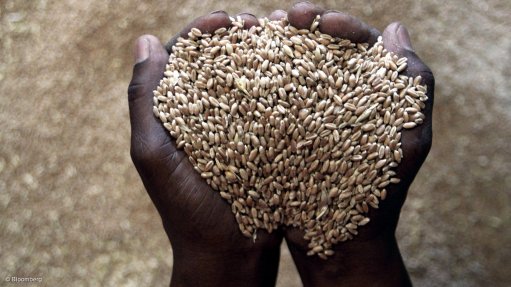On-The-Air (15/01/2016)
Every Friday morning, SAfm’s AMLive’s radio anchor Sakina Kamwendo speaks to Martin Creamer, publishing editor of Engineering News and Mining Weekly. Reported here is this Friday’s At the Coalface transcript:
Kamwendo: The combined value Apple, ExxonMobil and Google has been lost by the world’s struggling mining industry, which is at an 11-year low.
Creamer: Since 2011 the value of the mining stocks on the stock exchanges have lost $1.4-trillion and those who do these calculations say it is equal to the combined worth of Apple, ExxonMobil and the company Alphabet that controls Google. So, that drives home just how decimated our mining industry is. We look, of course, at Anglo American itself and how that has lost like 90% of its value.
Then you go to the biggest of all, BHP Billiton, also severely wounded in this downturn. You look at Rio Tinto, the most gung-ho of them – still pushing out iron-ore like Saudi Arabia pushes out oil – it is beginning to look like a dinosaur dying on its feet. Its top man now likely to change as they are calling for a new CEO now, because once the pressure arrives like that, it is harsh on these big CEOs.
Vale of Brazil, the other big one, not only hit by the terrible economy of Brazil and huge political problems in Brazil, but also as it is listed on the New York Stock Exchange, its shares are decimated and it’s looking to sell off a lot of its iron-ore ships that were the pride of the company, because Vale not only mines but also does all the logistics as well.
Every time a devaluation takes place in the Chinese currency, we have this huge wobbling of the market, not only their stock exchange markets, which are mainly internal. When the Chinese currency falls, you can see a lot of problems in the stock markets throughout the world, which prompted the columnist which looks at this every week for the Financial Times to say, by any measure, this is probably the worst start to a year that the stock markets have had since records began.
Kamwendo: Yet another diamond mine is closing and mines are coming under the auction hammer around the world.
Creamer: You don’t think of auctioning mines, but when they auction a mine, then you can see they want a change fast. They want it to happen now. We see Anglo American, which is closest to us, now wanting to auction a niobium mine and a phosphate mine in South America. It has moved on it very quickly, since announcing that it wants to do so at the end of the year.
We see the bids have to be in by mid-year. We see some names coming up of interested parties, but we are sure that there is probably going to be a schizophrenia here because niobium is used in jet engines and to have light weight steels in cars. Phosphate is very different and they want to try and sell them together as a package.
Niobium, there has been talk of companies close to us that are looking at that, but we will see what the outcome is and it is going to happen fairly quickly, because Anglo American wants to report a lot of its sales before the end of February. Another diamond mine, this time close to home, Damtshaa in Botswana, being put on care and maintenance. That follows the Snap Lake closure in Canada, which never had a chance to make a profit, because of the troubled diamond industry.
You can see that word beneficiation in our local area, Botswana trying to add value to diamonds. It is not as easy at it looks, particularly with this downturn. You can have diamonds polished at home, but will you be able to sell them at prices that you thought you would? People all calling for lower prices of polished diamonds. They say the rough diamonds are too high to in price. A lot of tension in the industry at the moment.
Kamwendo: Former President Kgalema Motlanthe is calling for an efficient, collective solution to the problems of South Africa’s battered mining industry.
Creamer: The former President Kgalema Motlanthe has been very close to the mining industry. His late father worked for Anglo American and his two brothers worked for Anglo American. He was a unionist for many years and when he went into politics he also kept in touch with mining.
In fact, during the crisis of the five-month platinum strike, he then put together government, business and labour and worked out a framework so there would not be so much violence. He dealt with them over a long period of time. He has got a fantastic insight and he is saying that we should use this crisis in mining as an opportunity now to really rebuild, materially, this industry, but have a timeframe like we had with the World Soccer Cup. Give ourselves a deadline and proper timeframe.
Look how well we did with the Soccer World Cup, we had all those targets to meet and we ticked every box. We must do the same thing, business, labour and industry must come together now and do the same thing. Realising that we have got to be competitive and in order to be competitive worldwide when this upturn comes back, we need to modernise. To modernise now we must look around now at what is done in the rest of the world.
He is saying that codetermination basis that Germany works on, which has labour in the supervisory board. Why don't we look at that, because it worked so well for them, you never have German labour making huge demands during downturns, but then they accelerate demands during the upturns. They have got this huge insight into the business and we need that trust deficit to go. He is advocating a codetermination type of approach.
He is saying look at how the Swedish government could take in those migrants from Syria, because they knew how many jobs were available and they knew that they could train these people. They are continually monitoring what skills they need. Business is feeding into them their modernisation programme and what skills they will need and they have got massive training process there. They can do that, so maybe we should follow that in our modernisation of our South African mining industry, which is really struggling at the moment.
Kamwendo: Thanks very much. Martin Creamer is publishing editor of Engineering News and Mining Weekly.
Comments
Announcements
What's On
Subscribe to improve your user experience...
Option 1 (equivalent of R125 a month):
Receive a weekly copy of Creamer Media's Engineering News & Mining Weekly magazine
(print copy for those in South Africa and e-magazine for those outside of South Africa)
Receive daily email newsletters
Access to full search results
Access archive of magazine back copies
Access to Projects in Progress
Access to ONE Research Report of your choice in PDF format
Option 2 (equivalent of R375 a month):
All benefits from Option 1
PLUS
Access to Creamer Media's Research Channel Africa for ALL Research Reports, in PDF format, on various industrial and mining sectors
including Electricity; Water; Energy Transition; Hydrogen; Roads, Rail and Ports; Coal; Gold; Platinum; Battery Metals; etc.
Already a subscriber?
Forgotten your password?
Receive weekly copy of Creamer Media's Engineering News & Mining Weekly magazine (print copy for those in South Africa and e-magazine for those outside of South Africa)
➕
Recieve daily email newsletters
➕
Access to full search results
➕
Access archive of magazine back copies
➕
Access to Projects in Progress
➕
Access to ONE Research Report of your choice in PDF format
RESEARCH CHANNEL AFRICA
R4500 (equivalent of R375 a month)
SUBSCRIBEAll benefits from Option 1
➕
Access to Creamer Media's Research Channel Africa for ALL Research Reports on various industrial and mining sectors, in PDF format, including on:
Electricity
➕
Water
➕
Energy Transition
➕
Hydrogen
➕
Roads, Rail and Ports
➕
Coal
➕
Gold
➕
Platinum
➕
Battery Metals
➕
etc.
Receive all benefits from Option 1 or Option 2 delivered to numerous people at your company
➕
Multiple User names and Passwords for simultaneous log-ins
➕
Intranet integration access to all in your organisation




















